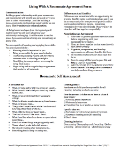Changing Spaces at Merrill
A Living-Learning Community
An important aspect of the college experience is learning to coexist with a diverse group of people in a community living environment. Hopefully, this relationship will be positive and rewarding, but it can also be challenging. Differences are normal and offer an opportunity for growth. Conflict exists in all relationships, and it can be an opportunity for interpersonal growth and learning about different people. Sometimes roommates can be close friends; some may not be, but can live together respectfully.
All students will review a Living Agreement Form with their roommates in the first three weeks of the quarter. Many roommate issues are rooted in communication, and the Living Agreement Form provides residents an opportunity to discuss their lifestyles and establish mutual rules at the start of the quarter.
If you are having problems, we encourage all residents to communicate with each other first. Your Resident Assistant (RA) can host a roommate mediation to explore solutions to your situation, and if needed follow-up with the Coordinator for Residential Education (CRE). RAs and CREs are highly trained in communication and conflict resolution, and many times roommate issues can be worked out easily. If both the RA and CRE deem a move would be beneficial, then the Housing Office will examine alternative arrangements.
The Room Change Process
Housing Freeze
The first two weeks of every quarter experiences a housing freeze. During this time no room changes will be made. This allows students time to settle in and adjust to a new living/learning environment. After you have lived in your assigned space for a few weeks you will have the opportunity to request a change.
Requesting a Room Change (within college)
The swap process depends on the nature of the change, and whether you are looking to transfer to a space within the college, or to a different college. Generally, any request to swap rooms is a multi-step process that may take several weeks to complete, and is usually performed in the breaks between quarters.
If it is a roommate situation, we encourage all students to attempt working it out with their roommates first. The second step is to have a meeting with the RA to explore possible solutions to the situation. After the proposed solutions have been attempted, the RA may make a recommendation to their supervisor for a student to be moved and the process advances to a meeting with the CRE. The CRE will also explore possible solutions, including a mediation with the occupants of the room. After solutions have been attempted and it is the CRE's recommendation that a student be moved, they will make a recommendation to the Housing Coordinator. At this point, the Housing Coordinator will look for an appropriate space. The timeframe may be lengthy depending on availability. For other situations be sure to speak to your RA, or make an appointment with the Crown/Merrill Housing Office by email at crownmerrillhousing@ucsc.edu to discuss your situation.
*Note: When requesting a room change, students must understand:
- They will be charged the appropriate room rate for the type they move in to, which may be an increase or decrease from their current housing fee.
- Their meal plan may change in accordance with the preferences indicated on the housing application.
Requesting a Room Change (transfer colleges)
Transfers between colleges commonly occur during the breaks between quarters.
Students cannot transfer colleges until after passing their college's core course.
Students interested in transferring colleges should contact the Housing Coordinator of the college they currently live at.
*Note: When requesting a room change, students must understand:
- They will be charged the appropriate room rate for the type they move in to, which may be an increase or decrease from their current housing fee.
- Their meal plan may change in accordance with the preferences indicated on the housing application.
Housing Coordinators will work together to identify potential spaces. However, keep in mind that a transfer request is not a guarantee, and is subject to availability, time of the year, local college policies, and judicial standing. In addition, college affiliates get higher priority than non-affiliates. Questions about transferring colleges can be addressed to your current Housing Coordinator.


